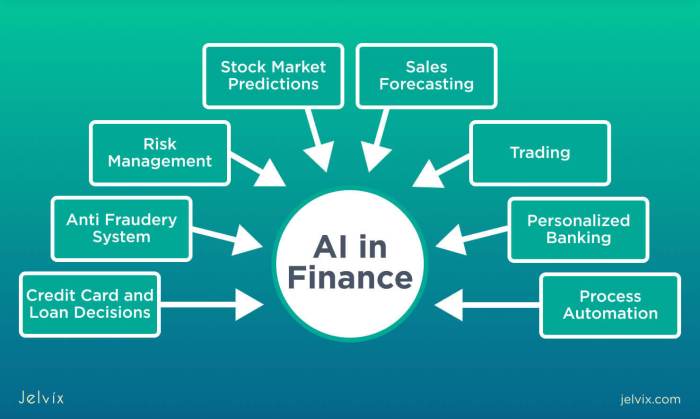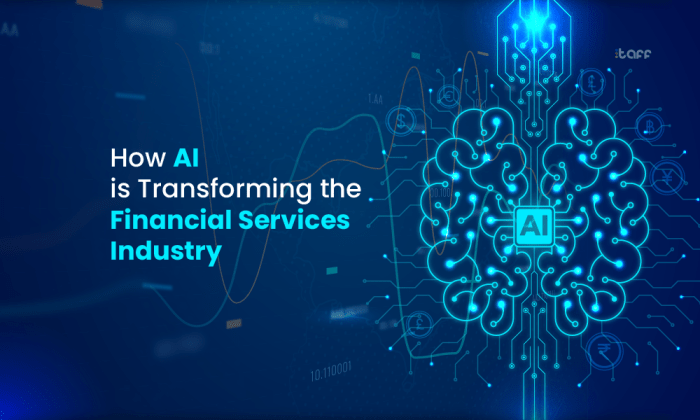Delving into the realm of AI for financial services, this intriguing topic sheds light on the transformative power of artificial intelligence in the financial sector. From revolutionizing banking to redefining risk management, AI is at the forefront of innovation in the financial industry.
Overview of AI for Financial Services

AI has revolutionized the financial services sector by offering advanced capabilities that enhance efficiency, accuracy, and customer experience. Through the utilization of machine learning algorithms and data analytics, AI is transforming various aspects of the financial industry.
AI in Banking
In banking, AI is utilized for customer service chatbots, fraud detection, personalized recommendations, and credit scoring. These applications streamline operations, improve decision-making processes, and enhance overall customer satisfaction.
AI in Insurance
In the insurance sector, AI is employed for claims processing, risk assessment, customer segmentation, and underwriting. By analyzing vast amounts of data, AI algorithms can predict outcomes, identify patterns, and optimize pricing strategies for insurance products.
AI in Investments
For investments, AI is used in portfolio management, algorithmic trading, market analysis, and robo-advisors. These applications enable investors to make data-driven decisions, automate trading processes, and optimize investment strategies based on real-time market insights.
AI in Risk Management
In risk management, AI plays a crucial role in identifying potential risks, conducting stress tests, and developing models for risk assessment. By leveraging AI technologies, financial institutions can proactively manage risks, mitigate potential threats, and ensure compliance with regulatory requirements.
Benefits of AI in Financial Services
AI offers numerous advantages when implemented in financial services, revolutionizing the industry with its capabilities to streamline processes, enhance customer experience, and improve efficiency.
Enhanced Customer Experience
AI plays a crucial role in transforming customer experience in banking and financial institutions. Through personalized recommendations, AI algorithms analyze customer data to offer tailored financial products and services. This level of customization fosters stronger relationships with customers, leading to increased satisfaction and loyalty.
Efficiency and Cost-Saving Benefits
One of the key benefits of AI in financial services is its ability to automate repetitive tasks, such as fraud detection and customer support. By utilizing AI-powered tools, financial institutions can significantly reduce manual intervention, leading to faster response times, improved accuracy, and cost savings.
AI algorithms can detect anomalies in real-time, flag suspicious activities, and provide immediate alerts to prevent fraud, ultimately safeguarding the financial institution and its customers.
Challenges and Limitations of AI in Financial Services
AI technology has undoubtedly revolutionized the financial services industry, offering numerous benefits and opportunities. However, its adoption also comes with several challenges and limitations that financial institutions need to address to maximize the potential of AI.
Challenges Faced by Financial Institutions
Financial institutions face various challenges when integrating AI technology into their operations. One of the primary challenges is the high cost associated with implementing AI systems. From acquiring the necessary hardware and software to training staff and maintaining the systems, the initial investment can be substantial.
Additionally, there may be resistance from employees who fear that AI will replace their jobs, leading to internal conflicts and decreased morale.Another significant challenge is the lack of regulatory clarity surrounding AI in the financial sector. As AI systems become more advanced and autonomous, regulatory bodies struggle to keep up with the pace of innovation.
This can create legal uncertainties and compliance issues for financial institutions, making it challenging to navigate the regulatory landscape effectively.
Limitations of AI in Data Privacy and Security
While AI has the potential to revolutionize data analysis and decision-making processes in financial services, it also raises concerns about data privacy and security. AI systems rely on vast amounts of data to function effectively, which can include sensitive customer information.
Ensuring the privacy and security of this data is crucial to maintaining trust with customers and complying with data protection regulations.Furthermore, AI algorithms are susceptible to biases and errors, which can have serious implications for financial institutions. Biased algorithms can lead to discriminatory practices, while errors in AI systems can result in inaccurate decisions that impact financial outcomes.
Addressing these limitations requires ongoing monitoring, testing, and oversight to minimize risks and ensure the integrity of AI applications.
Risks of Over-Reliance on AI Systems
Financial institutions must be cautious about over-relying on AI systems for critical financial decisions. While AI can enhance efficiency and accuracy, there is always a risk of technical failures or malfunctions that could have severe consequences. In the event of a system failure, financial institutions may face operational disruptions, financial losses, and reputational damage
This opacity can erode trust with customers and regulators, raising concerns about the transparency and fairness of AI applications in financial services.In conclusion, while AI offers tremendous potential for innovation in financial services, it is essential for financial institutions to address the challenges and limitations associated with its adoption.
By proactively managing risks, ensuring data privacy and security, and maintaining human oversight, financial institutions can leverage AI technology effectively to drive growth and competitiveness in the industry.
Future Trends and Innovations in AI for Financial Services

AI technology continues to advance rapidly, and its impact on the financial services industry is profound. As we look towards the future, several trends and innovations are shaping the way AI is utilized in this sector.
Personalized Financial Recommendations
AI is increasingly being used to provide personalized financial recommendations to customers. By analyzing vast amounts of data, AI algorithms can identify individual preferences, risk tolerance levels, and financial goals to offer tailored advice. This trend is expected to grow as financial institutions strive to enhance customer experience and loyalty.
Predictive Analytics
Another key innovation driven by AI in financial services is predictive analytics. By leveraging machine learning algorithms, financial institutions can forecast market trends, customer behavior, and potential risks with greater accuracy. This enables proactive decision-making and risk management, leading to improved operational efficiency and profitability.
Disruption of Traditional Practices
AI is poised to disrupt traditional financial practices in the coming years. With advancements in natural language processing, chatbots and virtual assistants are becoming more sophisticated, revolutionizing customer service and support. Additionally, the automation of routine tasks through AI-powered solutions is streamlining processes and reducing operational costs for financial firms.
Enhanced Fraud Detection
One of the future trends in AI for financial services is enhanced fraud detection. AI algorithms can analyze patterns and anomalies in real-time transactions to detect fraudulent activities swiftly and accurately. This proactive approach to fraud prevention is crucial in safeguarding financial assets and maintaining trust with customers.
Regulatory Compliance Solutions
AI is also driving innovation in regulatory compliance solutions for financial institutions. By automating compliance processes and monitoring transactions in real-time, AI can help organizations adhere to complex regulatory requirements more efficiently. This not only reduces the risk of non-compliance but also ensures a more transparent and secure financial ecosystem.
Final Review

In conclusion, the future of financial services is intertwined with the advancements in AI technology. As we embrace the potential of AI to drive efficiency, enhance customer experiences, and shape the landscape of financial practices, one thing is certain - the evolution of AI in financial services is a journey worth following.
FAQs
How is AI revolutionizing risk management in financial services?
A: AI is enabling predictive analytics and real-time monitoring to identify potential risks before they escalate, providing financial institutions with a proactive approach to risk management.
What are the key advantages of implementing AI in banking operations?
A: AI streamlines processes, reduces errors, and enhances decision-making capabilities, leading to improved operational efficiency and customer satisfaction.
What are the main challenges faced by financial institutions when adopting AI technology?
A: Challenges include data security concerns, integration complexities, regulatory compliance, and the need for upskilling employees to work effectively with AI systems.
How can AI improve customer experience in financial institutions?
A: AI enables personalized recommendations, faster response times, and efficient customer support services, creating a more tailored and seamless experience for customers.


